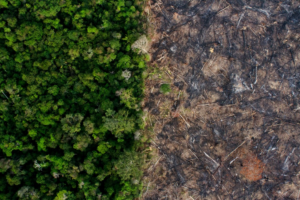This is an archival of an essay originally published in (lore), a social ecology zine, in 2019.

The Amazon Rainforest, Uru-Eu-Wau-Wau territory // Photo by Gabriel Uchida
From the emergent layers and the canopy, inhabited by the towering Brazil nut trees
which provide homes for the owls and warblers and the captivatingly colorful tanagers, to
the understory where the snakes, frogs, tapirs, jaguars and countless other lifeforms dwell,
the Amazon rainforest is a lively ecosystem, exhaling oxygen in the Earth’s atmosphere and
providing an indispensable haven for our planet’s biodiversity. Indeed, this forest is a vital
organ of the Earth’s biosphere, carrying out many crucial functions which support all life on
Earth, storing carbon, deflecting and containing solar heat, absorbing carbon from the
atmosphere and providing habitats for a stunning variety of life.
As of recently, though, large swaths of the Amazon rainforest have come to rather
resemble Hell as catastrophic fires rage. While we have already seen a drastic increase in
wildfires in the Amazon this year due to climate change, this time it is due to the actions of
Brazil’s president Jair Bolsonaro and his destructive agroindustry policies: all these trees
and wildlife and the indigenous populations of the forest aren’t doing anything to raise
Brazil’s GDP, so they must be destroyed to make way for the more profitable cow pastures
and mining operations, and so he used his typical nationalist rhetoric to incite farmers,
ranchers and others. Through this inherently anti-ecological lens of capitalism, anything that
is not profitable has no justification for existence, and is simply a blank slate to be
demolished, paved over and capitalized on.
But this ideology undermines the very systems that support and perpetuate all life on
Earth. Ultra-nationalism – exemplified here by the Bolsonaro administration’s slogan of “the
new hopes for the Homeland: Brazil above everything!” – stands at odds with the forest, a
being which spans many imaginary borders and doesn’t particularly care to serve any one of
these nations whose artificially enclosed lines overlap with it over another. Its very existence
contradicts the interests of fascism, and perhaps even probes at its logical coherence in the
first place.
Just as the Amazon is a major organ of our ecosystem, the deadly trio of fascism,
capitalism and colonialism constitute a parasitic disease which infests and eats away at it. If this organ fails, it will be a crippling, almost certainly fatal blow to all complex life on Earth.
And this is a very real threat. The Amazon has already lost a fifth of its original expanse, and
scientists believe that if another fifth is lost – something we are very much on track for if we
don’t do something about it – a “dieback” loop will be triggered where the forest will dry out
and collapse in on itself, destroying the most biologically diverse region of Earth and
unleashing its centuries of stored carbon into the atmosphere, sealing our fate.
And this is just one example of many potential ecological cataclysms we are on the
brink of. It is thus clear that capitalism is a death cult. In its gone-rogue pursuit of infinite
expansion, its grow-or-die imperative, it undermines the complex, interrelated, carefully
balanced systems which allow for life on Earth to exist and thrive. In other words, it is
directly at odds with life itself.
We are not something “external” to nature. We are embedded within it. And until our
society reflects that fact, we will continue to race along on this omnicidal track towards
ecological catastrophe. The indigenous inhabitants of the Amazon, such as the Uru-Eu-Wau-
Wau, know this well, their livelihoods directly depending on this now burning land.
Centuries of inherited wisdom guide them on how to work with and take care of the vast
forest they inhabit, and provide examples for ecological morals and perspectives on
relationship with nature (centered around harmony rather than ruthless exploitation for
unlimited profit) which we would do well to let inform the way we structure our own society.
This recent account provides a stark imperative to take it into our own hands,
wherever we may live, to fight back against the systems which ravage the very foundations of
life. We must directly challenge and provide alternatives for these deadly ideologies and
systems starting in our very own communities, in tandem with our bioregions and in the
world at large, fighting incessantly by sowing seeds to inoculate our neighbors against the
spread of this nationalism-justified ecocide and building counter-power today; distributing
informational handouts physically and digitally, and growing our own local ecological
activist and resistance networks, NOW.
It is true, the present and the future look bleak. But if there is hope, it lies within our
collective action and our perverse refusal to sit down and shut up while our world burns. It is
up to us, the people: we must grow an ecological society in the rotting shell of the old. Now,
pick up the seeds and start planting.